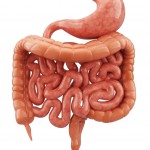Inflammatory Bowel Disease

Inflammatory bowel disease describes two main diseases:
- Crohn’s disease
- Ulcerative Colitis
Both conditions affect the gut but in different ways.
Crohn’s disease can cause deep inflammation to the full thickness of the intestine and can affect anywhere from the mouth down to the anus.
Ulcerative Colitis causes inflammation and ulcers to the inner-most lining of the large intestine.
What is it?
IBD is an autoimmune disease that mainly affects the gastrointestinal tract, however inflammation can also develop in other parts of the body (eyes, skin, joints and liver).
What causes IBD?
The exact cause of IBD is unknown despite much research in the area. There is some evidence that links genetic, environmental, immunological and bacterial factors as possible causes.
Both Crohn’s disease and Ulcerative Colitis can present as either one of two stages:
Active: When you’re having a flare and feeling unwell. You may experience some of the symptoms listed below
Remission: When you are feeling well and not experiencing symptoms
Presentation
IBD symptoms vary depending on the severity and location of inflammation. Symptoms can range from mild to severe and depend on whether the disease is in its active phase or followed by periods of remission.
These symptoms are commonly associated with the active phase:
- Diarrhoea
- Fever
- Fatigue
- Abdominal pain and cramping
- Bloody stools
- Reduced appetite
- Malnutrition
- Swollen joints, inflamed eyes
- Rash
Diagnosis
Diagnosis of IBD can be made using several different tests
- Blood tests
- Faecal examination
- X-rays
- Colonoscopy
- Gastroscopy
Treatment
Treatment depends on a number of factors
- Whether you suffer from Crohn’s disease or Ulcerative Colitis
- Which part of the gut is affected
- Severity of the disease
The aim of treatment is to reduce the inflammation which triggers symptoms. Treatment can reduce complications, improve long-term prognosis through symptom relief and in some cases, induce long-term remission.
Possible methods of treatment include:
- Anti-inflammatory drugs (inc. steroids)
- Antibiotics
- Immune system suppressors
- Surgery
- Nutrition therapy (enteral nutrition)
Diet
Most people with IBD are able to eat a varied diet and need not restrict particular foods. IBD sufferers are already more likely to suffer from nutrient deficiencies, this risk is only further exacerbated through the elimination of food groups or avoidance of certain foods.
During flare-ups:
Some people find that a plain, low-fibre diet is easier to tolerate when experiencing a flare up. A low fibre diet means restricting the skin and seeds found in fresh and dried fruits, vegetables, nuts, seeds and wholegrains. It is important to include enough energy and protein into your diet as weight loss is common during the active phase of IBD, especially with Crohn’s disease.
Common vitamin/mineral deficiencies are:
- Iron
- Folic acid
- Vitamin
- Calcium
It is best to consult with your gastroenterologist or specialist dietitian to determine whether you need to take vitamin and/or mineral supplements.
During remission:
When you are feeling well, it is important to eat a balanced diet so you can maintain your weight and correct/prevent against any nutrient deficiencies. A balanced diet is one which contains a healthy amount of foods from each of the five food groups:
- Breads and Cereals
- Meat, poultry, seafood, eggs and meat substitutes
- Dairy
- Fruit
- Vegetables
How can a dietitian help?
A specialist dietitian can assist by providing you with support and helping to design a dietary plan that works for you and your condition. As the nutritional management differs based on the stage of the disease, it is important you are eating what’s right for you at that point in time, and not restricting foods unnecessarily. A dietitian can educate you on how best to meet your nutrient requirements not only during a flare up, but also in the remission phase.
Sources
- Better Health Channel
- Crohn’s and Colitis Australia
- Gastroenterological Society of Australia
- Mayo Clinic